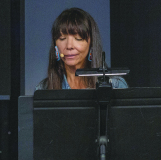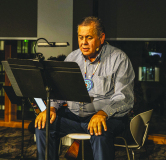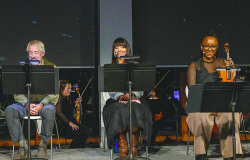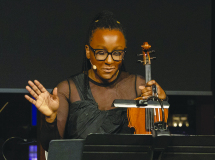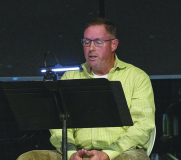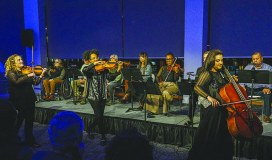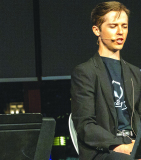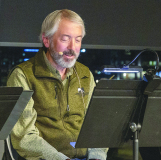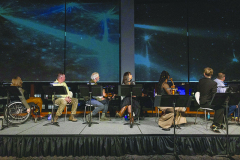No products in the cart.
The Big Dipper
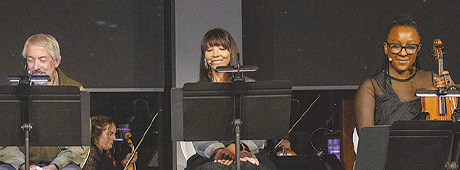
Edited by Jodi Eichelberger
Photos by Christina Birkinbine
What is your story going to be? This question launches every Story Story Night, an Idaho event now entering its fifteen season of sharing true stories live. As producing artistic director, I head a team that stages a show nearly every month, in which curated stories intermix with a community story slam. Normally, our storytellers work without notes. “Starry Story Night,” presented last October to a full house at an auditorium in Boise, was an exception.
It’s the only scripted show we’ve done and it didn’t follow our regular format in which storytellers come individually to the microphone to share their stories. Instead we wove in and out of each story. The conceit of the show was that just as we connect individual stars together to form constellations, we connect these stories to form a larger story. The script comprised a combination of recorded interviews and writing submitted by the selected storytellers. Though heavily edited, nearly all the text spoken by the individual storytellers was their own.
We chose “The Big Dipper” as our theme, which almost suggested we had to do something that was, well, bigger. In my early research into the science and mythology around the constellation, I noted it has seven major stars. Around the same time, I came across a map of Idaho that was divided into seven regions, so the idea was born to try to pull a storyteller from each of the seven regions of Idaho—something we had never done before.
Fishing for the storytellers began ten months before the show—and I literally found Reilly Hoy of Twin Falls while following a fly fishing thread. Both Blair Williams of Coeur d’Alene and Michael Riley of Potlatch were introduced to me by the head of Special Collections and Archives at the University of Idaho. When I heard CMarie Fuhrman of McCall read about the Frank Church Wilderness, I knew the show would benefit from her poetic language. Ted Stout of Picabo fell into place because he had written a book about Craters of the Moon, which celebrated its centennial in 2024. Another name for the Big Dipper is the “Drinking Gourd” and Jessica Joy used that phrase in a production she is preparing, so she came to represent southwestern Idaho. It’s fitting that Darren Parry has the first line in the show, as his story about the Bear River Massacre near Preston was the only one I knew I wanted to include going into this project. The Big Dipper is part of Ursa Major, the Great Bear, and I found that association interesting.
The following excerpt comprises roughly the first third of the “Starry Starry Night” text. This was our fourth production in this style, yet as I say, it was the first scripted one. I think the fact that this larger story encompassed each of the seven individual narratives must say something about how much we humans have in common—even though sometimes the space between us feels vast. —Jodi Eichelberger.
Blair Williams.
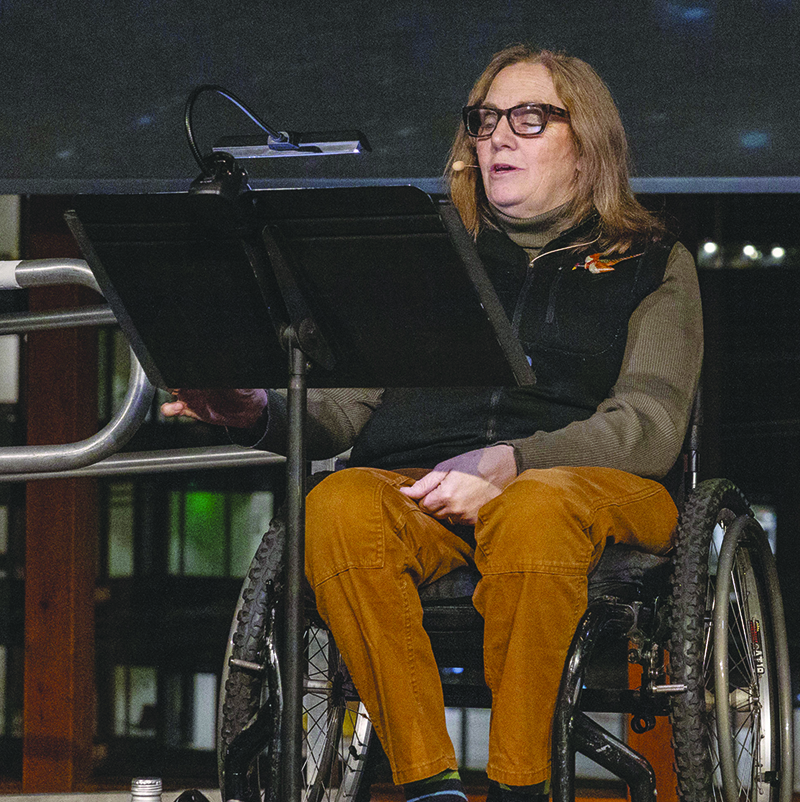
CMarie Fuhrman.
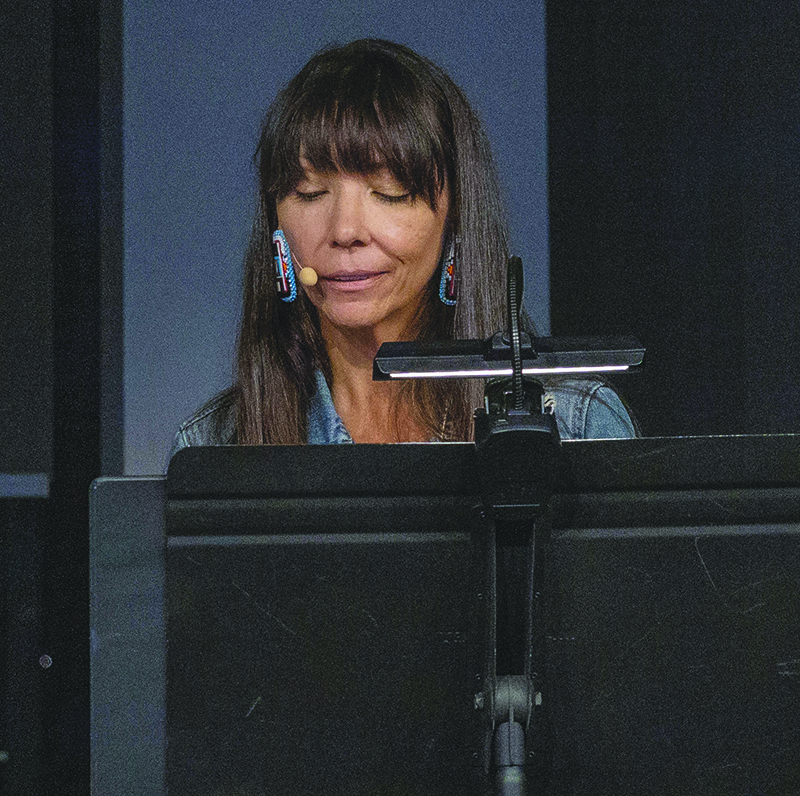
Darren Parry.
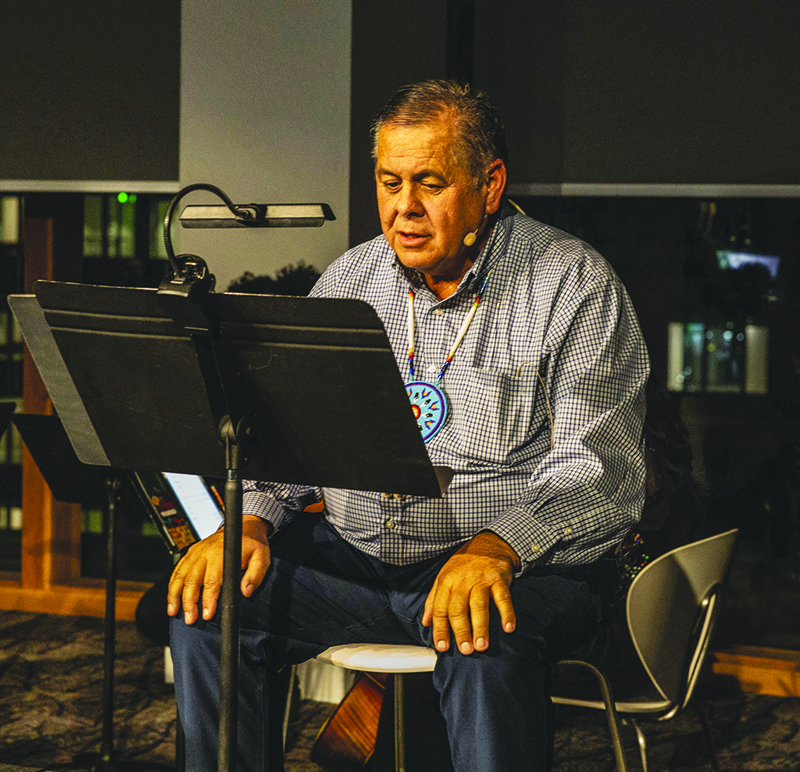
A humorous moment during the show.
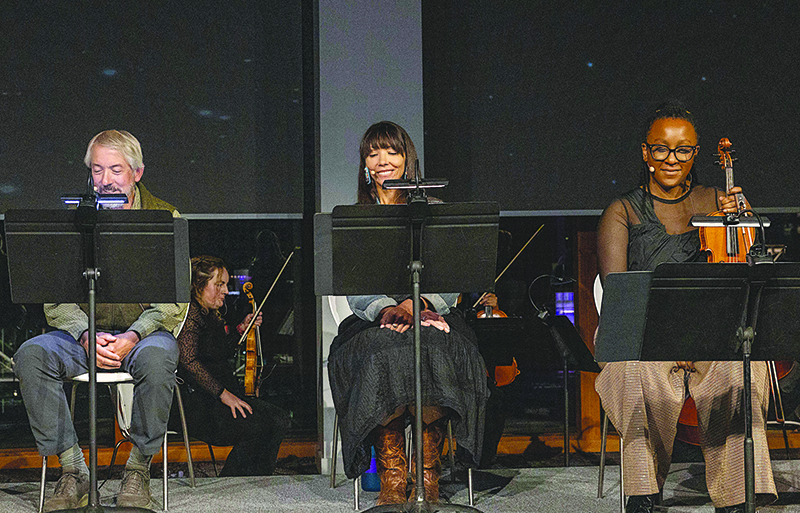
Jessica Joy.
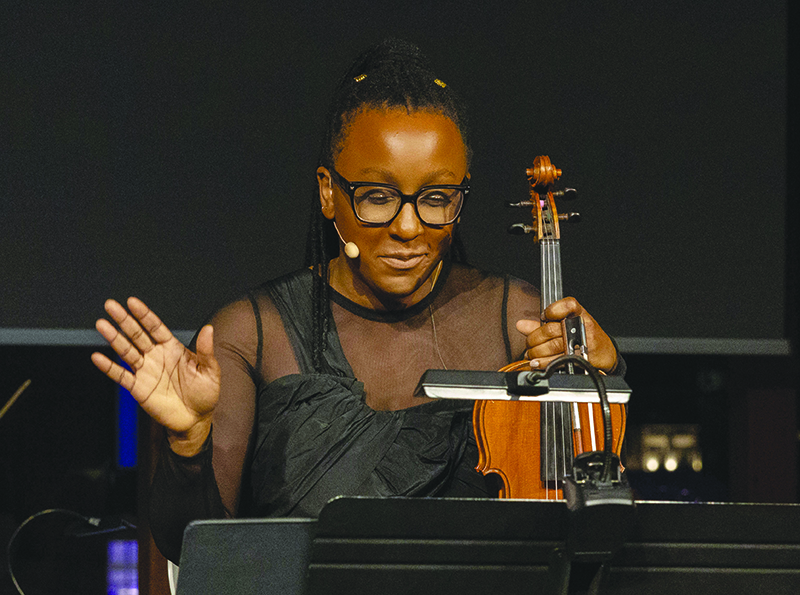
Jodi Eichelberger.
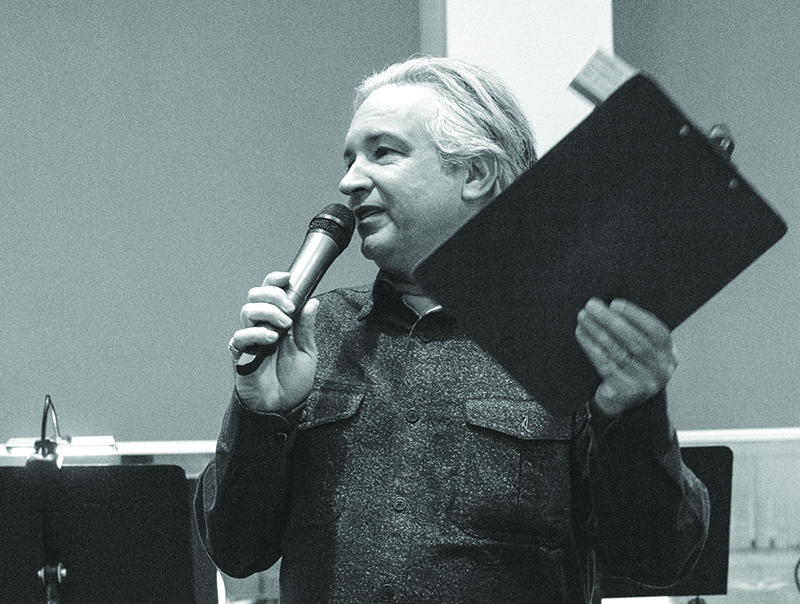
Michael Riley.
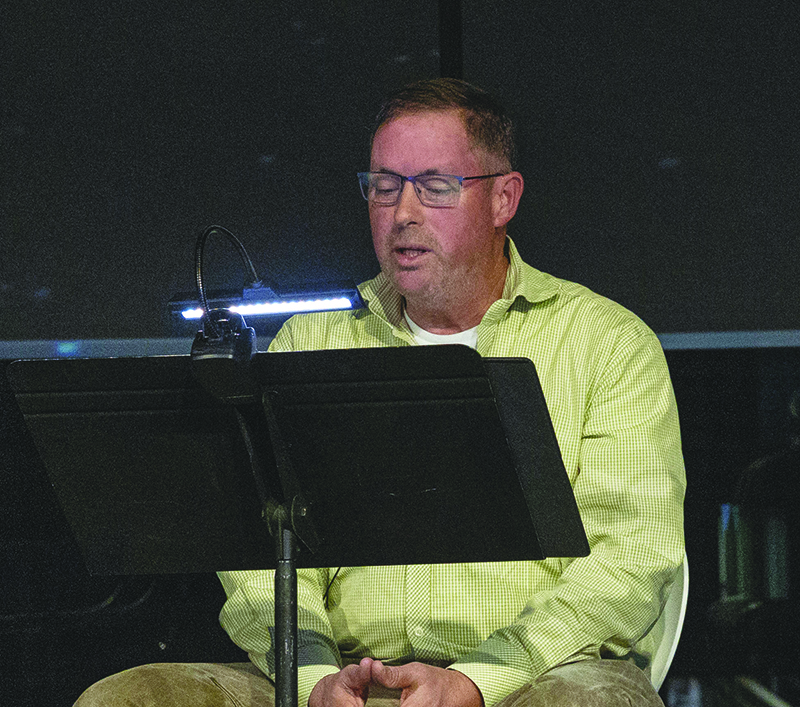
A musical interlude.
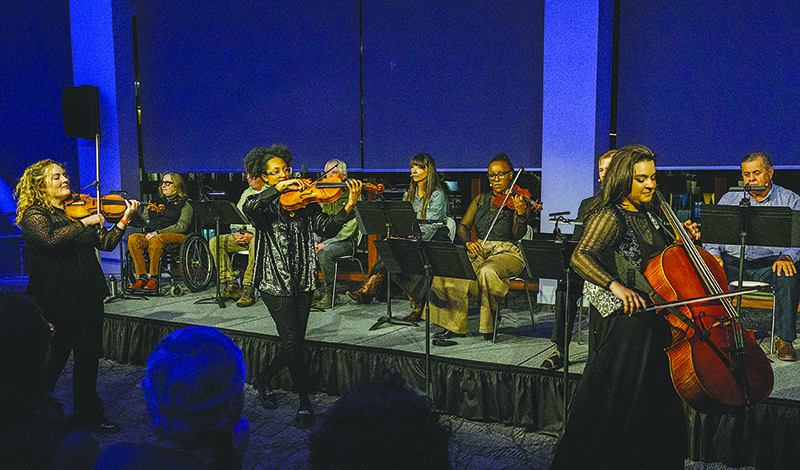
Reilly Hoy.
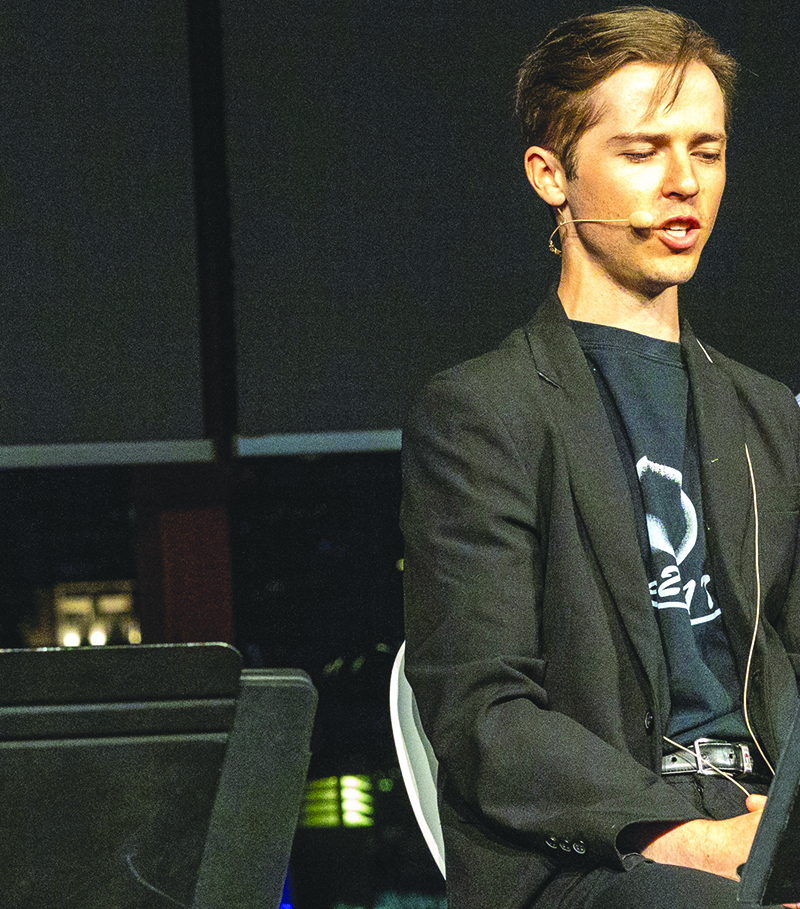
Ted Stout.
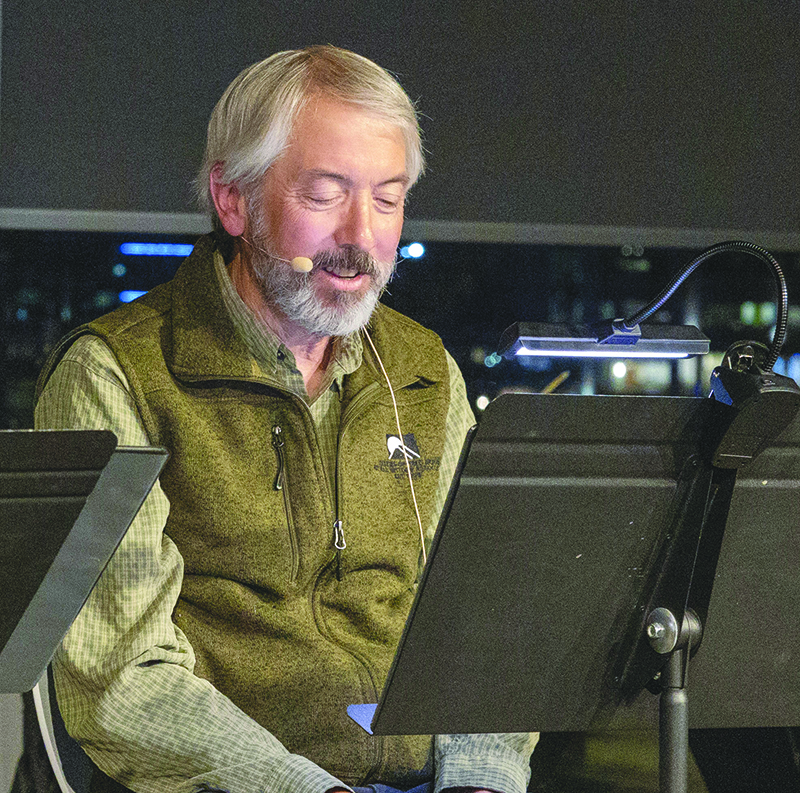
The storytellers watch a light show interlude.
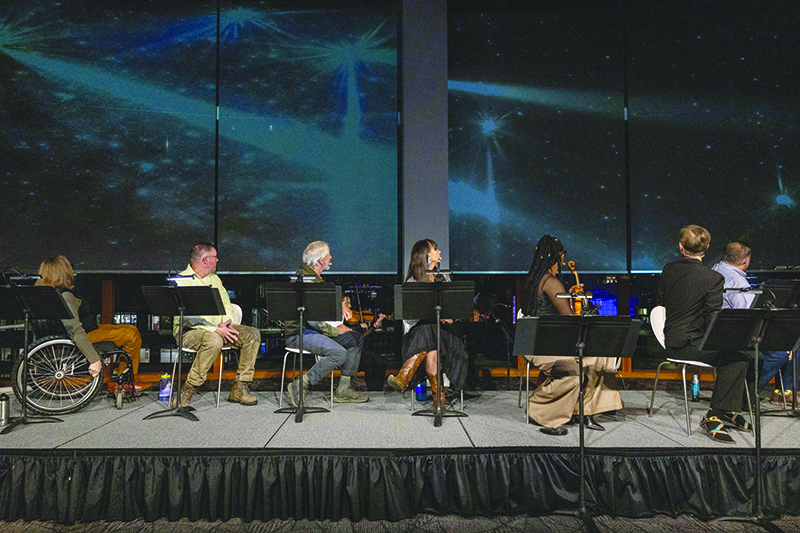
DARREN
My grandmother would often say to me, “What is your story going to be?”
BLAIR
I am from Idaho. I’m specifically from North Idaho. When traveling, and someone asks, “Where are you from?” I always respond with North Idaho.
REILLY
Twin Falls is—I don’t know, it’s funny. It’s like, if you’ve ever seen the movie Napoleon Dynamite—it’s not in Twin, it’s in Preston—but it’s very much accurate to what living in southern Idaho is like. There’s blue skies, green fields, cows, mountains in the distance, no one’s in a hurry but they drive fast anyway, and tater tots are a staple of our diet.
JESSICA
When we first moved to Idaho, we stayed in my grandparent’s guesthouse on their ranch in New Plymouth before my parents bought a house in the Treasure Valley.
CMARIE
I live in a fairly poor part of McCall.
TED
Picabo is about halfway between Craters of the Moon and Hailey.
MICHAEL
Potlatch is about seventy miles from Coeur d’Alene.
REILLY
Space is about seventy miles away from Earth, depending on how you define it.
DARREN
My people, the Northwestern Shoshone, have always lived in northern Utah and southeastern Idaho, and particularly the Bear River Valley.
BLAIR
I was the first student in my school district who was physically disabled to be integrated.
MICHAEL
My dad was beaten and jailed by a police officer when he spoke up for a Black woman seeking to integrate the high school and spoke back to a cop. The record stated he was drunk.
REILLY
When I was in high school I took an astrophysics class, which is probably not common.
TED
I had two young kids when my wife and I first moved to Picabo, and we wanted them to go to Blaine County schools, because it’s a very well funded school district in Idaho.
DARREN
My grandmother was an educated woman. She was the product of the boarding school system of the 1920s, a system designed to assimilate the Natives into the Euro-American culture.
BLAIR
I became disabled during a period of time in which the state still had the right to institutionalize someone like me. In fact, they had signed the papers. I was going to be forced to be sent to an institution to live out my life.
DARREN
Their creed was, “Kill the Indian to save the child.”
BLAIR
But my parents thankfully fought for me, and I was able to come home.
JESSICA
In my undergrad, I had so many things I wanted to do that professors would blatantly tell me were not possible for me, because I was not someone that was good enough or someone that was clever enough or deserving enough of those opportunities.
BLAIR
And the same was said at Montana State University. Even though they had some programs and they’d had some students with disabilities, we were few and far between. My first day in the architecture department, the chair of the department came to me and said, “You know, there’s this whole new division and world that’s opening up. It’s called Universal Design, and I think you’d be perfect.” I was so offended in my eighteen-year-old self to be told that would be the only area I would be able to work. So I was already put off by the program.
DARREN
The educational process was not easy on a young Shoshone girl.
JESSICA
After I graduated, I just…I couldn’t even play my violin. I couldn’t hold it without shaking. I couldn’t. I just couldn’t access this thing that was so important to me.
REILLY
It is kind of crazy to think that our atmosphere is perfect.
JESSICA
Everything is pristine, everything is perfection in the classical music culture.
BLAIR
“I think you’d be perfect,” he said.
REILLY
And then, outside of that atmosphere, is just cold, vast nothingness.
JESSICA
And if you’re not that, then are you anything? And I think that messaging just really sunk into me.
REILLY
Most of my friends growing up were farmers or ranchers, or like 4H people. So it was just like, you know, dirt-loving.
CMARIE
I am a person of the earth. I carry it beneath my fingernails like ten black and waning moons.
DARREN
On one occasion while attending the Washakie Day School, my grandmother’s teacher made her stand on a chair in front of the other children and said, “Mae, you are going to turn out to be just like these other children, sitting in the dirt and being useless for the rest of your life.”
CMARIE
My father, too, carried soil beneath his fingernails.
REILLY
In high school, I’d say half the men in my class had trucks, and would just take them out and get them dirty and that was it pretty much. Well, and it really mattered if you had the most dirt. It really was a contest.
DARREN
While in high school, my grandmother did something that has literally saved our culture: she began writing down all the stories that she had heard from her tribal elders, and her grandfather Da-boo-zee.
REILLY
I want to write all my stories that I have before I forget them.
BLAIR
I dropped out of school and returned home. I told my parents I just need to better define what it is I’m trying to do. I know that I want to work in the creative sector, but I don’t know what that means.
TED
I have a degree in geology. And I love rocks.
MICHAEL
I was a history teacher.
DARREN
My last name, Parry, comes from Joseph Parry, a schoolteacher at the Washakie Day School. Joseph allowed his young son Grant to attend school with the Indian children. Grant Parry and Mae Timbimboo met as five-year-old children and the Parry name comes from their union.
CMARIE
For eleven months I was nameless. I was just called baby girl.
JESSICA
I’ve always just kind of been like, no, there’s more…There’s more that I can do.
REILLY
People just notice the Big Dipper, but it’s a much bigger constellation than that.
JESSICA
And I just need someone to be able to see it. And then I think if they see it, then we can all do amazing things together.
[Music]MICHAEL
Potlatch hosted a Major League Baseball All-Star Game in 1914, and had a bar at Riverside that was a roller-skating venue by day and a good place to get stabbed at night. Johnny Cash once called it, “The toughest place I ever played.” We wear all of that as a badge of honor.
The mill went out in 1980, and before that the company mercantile took out the heart of the town when it burned to the ground in the fifties. The original school is now low-income housing, but a hundred-plus years after being built it’s still pretty fabulous. After the mill was dismantled and the town was literally sold off piecemeal, folks managed to find a reason to stick together, to still be a town, and we’re still here. You can be a small town and still be a star.
REILLY
It’s very rural, but at the same time, if you’re from Twin Falls you’re considered a city boy because it’s like the big city of the smaller area.
MICHAEL
Keith Peterson, our former state historian, who wrote a book about our town called Company Town, tells a story of how the city fathers of Potlatch were worried about the creeping lack of morality in the town way back when drinking was still forbidden in city limits and movies were starting to have a big following. He complained that the theater was showing the wrong sorts of shows, and kids were seeing movies that were “too rotten for Moscow.” When we heard that line we immediately went out and had it silkscreened onto T-shirts.
BLAIR
I’d be on a plane, and somebody would inevitably ask, “Where are you from?” “I’m from North Idaho, from Hayden Lake.” And they would get a look on their face. And I’d go, “No, no, no, no, no, no, please, please.” I began to try to unbury the culture of who I believed we really were. And usually with almost no luck.
MICHAEL
My wife and I, we met at Washington State University. And then we started looking for homes and there’s nothing available on the Washington side of the border. Everything is too expensive for us. But across the border in Idaho, where everything’s kind of wide open Wild West, there were cheap places that we could find.
DARREN
My grandmother took me out there all the time, and we’d sit on the edge of this bluff, and she’d tell me, “This is where the troops were.” So she would tell me all these stories, and as a young boy my eyes were wide open.
MICHAEL
We went to this plant nursery in Potlatch just to to look at some plants, and the owner said, “Well, hey, are you guys looking for a house?” My wife Diane was eight months pregnant, and I didn’t have a job, and she just had an adjunct university job where you get fired and hired each year. And so we’re like, “Sure.” And we walked up the hill, you know twenty yards, and there was this house that was perfect. It was built in 1924. So it’s turning a hundred this year.
TED
We celebrated the Centennial Celebration of Craters of the Moon this year. I wrote a book of its hundred-year history.
CMARIE
It’s probably one of the poor parts of McCall just because the houses were never very valuable, even though we have a little bit of acreage, by which I mean two.
MICHAEL
Two acres and a 2,200 square-foot house for $119,000.
TED
What we call the original Craters of the Moon monument was about 54,000 acres.
JESSICA
My grandparents were surrounded by acres and acres and acres.
DARREN
My tribe acquired thirty acres of land from the New York Land Trust in 2002, which was the first-ever land we owned.
TED
At the stroke of a pen…
DARREN
After eight months of negotiations with the landowner…
TED
…Bill Clinton expanded the monument thirteen-fold in 2000.
DARREN
…the tribe managed to purchase 550 acres, including the north part of the Bear River, which was our goal.
TED
And now it includes almost all of the Great Rift, which is the big crack in the ground that is the volcano that created Craters of the Moon. It’s about a sixty-miles-long monument and preserve—including the part that’s still managed by the Bureau of Land management, it’s about 750,000 acres, which is about the size of the state of Rhode Island.
DARREN
The deal was closed just before the Bear River Massacre commemoration on January 29th, 2018. It is such a sacred place, such a place of peace. And it’s much more so now that we own the land.
BLAIR
Those of us in the Panhandle have a special connection to the place that we call home nestled in among the lakes and the mountains and the trees. I’ve often wondered, do people in southern Idaho do the same?
REILLY
We’re not very far from anywhere, you know. We got the mountains to the north of us, the south of us. Boise, the desert. I feel that a big part of growing up here was just we spend a lot of time outside.
MICHAEL
Here on the border between north and south, the Washington Palouse a couple of miles west and forests that go on forever just to the east, we’re an ecumenical group, in politics, culture, beliefs. My neighbors and I don’t need to agree on everything, but we’re far enough out that we depend on each other when we need help.
TED
Picabo is surrounded by Silver Creek. It’s a spring-fed creek that winds across the area and goes around Picabo. So there’s a lot of fly fishermen around these parts.
CMARIE
I do say that I live in the mountains with two dogs and a fisheries biologist.
REILLY
I was definitely a nerd growing up, like pretty much into books and stuff. I still love fishing. Fishing is a very big part of my life.
TED
I’m not a big fisherman myself, but I spend a lot of time around the creek. On hot summer days I like to run out there and jump in the water, which is very refreshing.
CMARIE
My partner, Caleb, will often fish, and I’ll help him when he’s surveying lakes. He’ll pull fish from the lakes and I’ll photograph and measure so that we can do those alpine lake surveys.
DARREN
Northwest Shoshone traveled to central Idaho when salmon were plentiful. They were nomadic gatherers, hunters, and fishermen.
BLAIR
My father had been offered a job in California. They invited me to join them as I had recently dropped out of college. When they asked me, I said, “No, of course not. I could never leave Coeur d’Alene. I could never leave this place. It’s so special to me.” At North Idaho College, where I was working, they would host every year a bagpipe festival.
DARREN
Now we have two hundred to four hundred people gather at that monument every year. And we have a small program. And so I wanted to be able to stand up there and say, finally, “We own the land again.”
BLAIR
Hundreds of bagpipers from around the world would gather, practice for the week, sometimes go out on the boats on the river, on the beaches, and play these beautiful works. I was working for the diesel mechanics department. My job was to put them onto computers. The diesel mechanics, students, directors, and instructors—well, they didn’t much care for bagpipe music and as the bagpipers would practice throughout the day, they would often mock them. So I went home that night and I spent the evening baking—baking brownies and cookies, and filling a large basket. The next morning I arrived on campus early and went from bagpiper to bagpiper to assure them that just because the diesel mechanics boys didn’t care for them didn’t mean the rest of us didn’t. So I was invited to join them at a pub that night.
JESSICA
Boise State had a fellowship. And so I thought, “You know what? Let me just apply. See if I get it, and I’m going to go get a free Masters.” I remember sitting down with a professor of mine…
BLAIR
I’m sitting next to one of the bagpipers.
DARREN
My grandmother would call me to sit at her feet, just like she sat with her grandparents, and listen to her tell stories.
JESSICA
…and I told her exactly what I wanted to do.
TED
I want to make the information understandable and relevant to visitors, so they in turn want to help preserve and protect the park.
REILLY
I’m just a writer, really. And so I want to write.
JESSICA
I want to study women of color in classical music. I wanted to see how I fit in the world, and if I if I did fit, because it didn’t seem like I did at the time.
BLAIR
I said, “What do you do?” He said, “I’m the head of the Santa Barbara Arts Commission.” I said, “Oh, but what do you do for a living?” And he said, “No, no, that’s what I do.” “Hang on a sec. This is a thing? How has this not been shared?”
JESSICA
I remember googling the name of one of the only African American classical musicians I knew: Florence Price. No information would come up at all. It didn’t seem like there was any history or any information about her. I just wanted to know. I just wanted to figure out how to build safety for me that I didn’t feel.
BLAIR
“And how do you, how do you do that?”
JESSICA
And she said, “I don’t know if I have the tools.’
BLAIR
And he said, “There is this degree. It’s called Arts Administration, and I happen to know that Golden Gate University has a new program in it.”
JESSICA
“But we are going to find the tools.”
BLAIR
So I got in my car and rushed to my parents and said, “I have to go with you and I have to go do this.”
JESSICA
And we’re gonna build out a special program specifically for me, so that I could find as much information as I could, and build a history that seemed impossible to find in textbooks. And that’s what we did. And I decided to do my thesis on Florence Price.
BLAIR
And as I’m driving down the main street, I said, “Please, universe, won’t you let me return to Coeur d’Alene some day and work in the arts? And if I’m pressing my luck, I’d really like to be working downtown.”
Story Story Night is the current City of Boise Cultural Ambassador. All Story Story Night shows are available on the organization’s podcast and many are also on their YouTube channel. For more information visit: https://storystorynight.org/
This content is available for purchase. Please select from available options.
Purchase Only
Purchase Only


